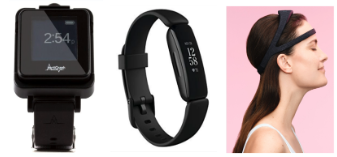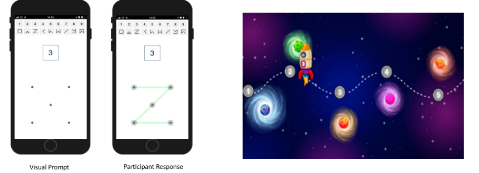Methods

Thank you for your interest in our research! Our projects incorporate and align the usage of wearables, ecological momentary assessment and smartphone-based assessments of cognitive markers, and important contextual information related to individualized behavioral, pain, sleep, and substance use patterns in children and adolescents.
Wearables

Wearable devices allow us to collect information surrounding activity, heart rate, and sleep quality and stages in the daily lives of our participants. Examples of wearable devices that we utilize are:
- ActiGraph GT9-X- The ActiGraph GT9X combines motion tracking technology with a programmable display and inertial measurement unit (IMU) for advanced research applications.
- FitBit Watches- This wireless fitness tracking device allows us to collect information surrounding activity, heart rate, and sleep quality and stages in the daily lives of our participants.
- Dreem 2 Portable EEG Headband- This portable, wireless EEG headband records, stores, and analyzes physiological data. We are currently using this device to objectively measure sleep in our participants.
Ecological Momentary Assessments
Ecological Momentary Assessments (EMAs) are deployed on smartphone apps to collect repeated, real-time assessments of levels of pain, mobility, mood, etc. over a period of time in naturalistic settings. Examples of EMAs we utilize are:
- AthenaCX- This smartphone application uses ecological momentary assessments to capture sleep, pain, energy level, and mobility responses from our participants and securely transmit them to the research team.
- Metricwire- MetricWire is a platform for mobile data collection. It allows us to design complex studies online and provides our participants with the option of responding using their smartphones and other electronic devices. It gives us access to online tools that lets us customize our study and leverage the onboard devices of the smartphone
Digital Cognitive Tests

Digital Cognitive Tests are gamified cognitive tasks deployed on smartphone apps to assess cognition in naturalistic settings. Examples of Digital Cognitive Tests we utilize are:
- Cambridge Cognition- This smartphone application is used by our participants to assess global cognitive ability and psychomotor vigilance.
- Calm-It App-This smartphone application was created by the National Institute of Mental Health to assess inhibitory control.
- Inquisit Player- This app allows us to easily create and execute experiments in a controlled and customizable environment. Using this app, we can design experiments that range from simple reaction time tests to complex cognitive tasks, such as attention and memory tests. This software allows for precise control of stimulus presentation, data collection, and experimental conditions.
